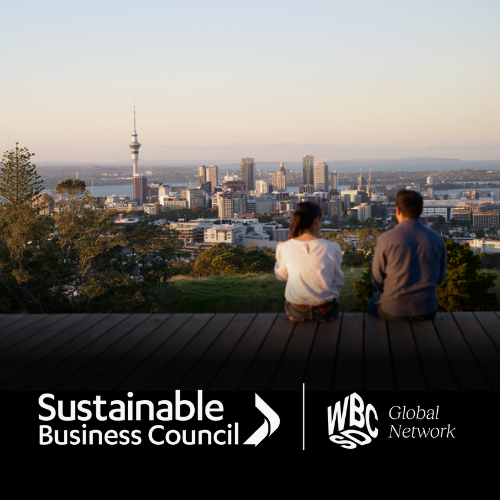Guest blog: My SKYCITY Kitchen Rules
Diverting food waste from landfills can help companies reduce their greenhouse gas emissions. Courtney Simpson, Group Manager Environment, tells us how SKYCITY Auckland diverted the equivalent of 142 buses of food from landfill, reducing their emissions by 15% in one year.
Diverting food waste from landfills can help companies reduce their greenhouse gas emissions. Courtney Simpson, Group Manager Environment, tells us how SKYCITY Auckland diverted the equivalent of 142 buses of food from landfill, reducing their emissions by 15% in one year.
Dealing with waste is no small feat for any large company, and it’s an issue that is increasingly topical with potential increases in waste disposal costs to landfill, international borders being closed to our recycling, and, most importantly, the need to take an environmentally sustainable approach.
Most of the emissions from waste are produced when biodegradable matter is sent to landfills, and produces methane when it breaks down. According to the UNFCCC GHG database, New Zealand’s waste emissions per capita are the second highest in the developed world – more than double the average – so reducing the amount of food waste sent to landfill can make a direct impact on reducing our emissions.
In early 2016, we identified that our greatest waste reduction opportunity was diverting food waste from landfill. We all know, change is not easy, but with great partners and the enthusiasm of our staff, here’s how we we diverted the equivalent of 142 buses of food from landfill and reduced our emissions by 15% in one year.
The challenge
SKYCITY Auckland has 20+ kitchens producing around 1 tonne of food waste a day and more than 500 kitchen staff that interact with or create food waste.
In June 2016, in accordance with the Food Act, we began donating as much surplus food as possible to Kiwiharvest, and will continue to do so – to date totalling 700kgs since implementation. And while we are proud of this, it only scratched the surface of what was going to landfill. We needed to do more.
The solution
In May 2017 we partnered with EnviroNZ to implement a new waste management system.
In the first financial year (to 30 June 2018) we saw nearly 500 tonnes of food waste diverted to be commercially composted and used on kiwifruit orchards and in the landscaping industry in South Auckland.
How we got there
We took several steps to ensure we achieved the best possible results for the business and for the environment. This was not an individual effort and took a small village to get right.
Selecting a partner
EnviroNZ have been a close partner throughout the process, supporting us with the delivery of training, new signage, and new collection processes. They also supported us with a seven-day-a-week service, a first for their business, and have continued to work with us on innovative solutions to future proof our waste systems.
Work with the space you’ve got
Space is at a premium in any business. To accommodate the extra 110 wheelie bins for the programme, we needed to refurbish our main site dock and install a cleaning station to get them back into circulation as fast as possible.
For each of our 20+ kitchens, we used the smallest wheelie bins possible and developed tailored plans for each to ensure our kitchen teams could still do their work smoothly.
Communicate the business value
Sustainable solutions are ones that meet both our business and environmental goals. Adding another waste service was an additional cost to the business, but in the long-term we considered this an investment in reducing future landfill costs.
Getting internal teams on board
With more than 500 people to reach in our kitchens, we started our communications at the top by getting our executive chefs on board with the vision. We followed up with numerous face-to-face meetings, an internal awareness programme, and fresh signage for anywhere our bins were; all with the help of EnviroNZ. Luckily, SKYCITY is full of passionate people, and the buy-in was awe-inspiring.
Own your own contamination
We wanted to make sure the product we were sending to be commercially composted was of a high standard. So we asked EnviroNZ to leave any contaminated bins on site for us to dispose of to landfill. While this seems counterproductive, we wanted to know exactly what the contamination was to enable us to learn from our mistakes, encourage behaviour change with feedback and improve our practices. This saw us achieve low levels of contamination quickly and a high standard of product sent to be composted.
What’s next?
We will take these lessons and continue to develop our waste programme outside of our kitchens and across our other sites, particularly in Adelaide and Hamilton.
We’re also continuing to explore a circular aspect with EnviroNZ that could potentially see our compost go to producers that we source from, whether that be a vineyard, orchard or other garden.
Finally, implementing a food waste stream means we can work with awesome companies like Ecoware to update single use plastics and packaging to commercially compostable products. We have started with items like coffee cups and lids, straws, takeaway cutlery and boxes across some of our outlets, and we are continuing on that journey.
Across other waste streams, sustainable solutions are more difficult to achieve. We will need to look globally for inspiration and put New Zealand’s can-do culture to the test to find some innovative solutions to manage our waste within our shores.
But this is a whole other topic that I’ll tackle in a future blog.
More information about the programme
Courtney Simpson is Group Manager Environment at SKYCITY.
Contact: Courtney Simpson, Group Manager Environment, SKYCITY
Phone:
Email:

